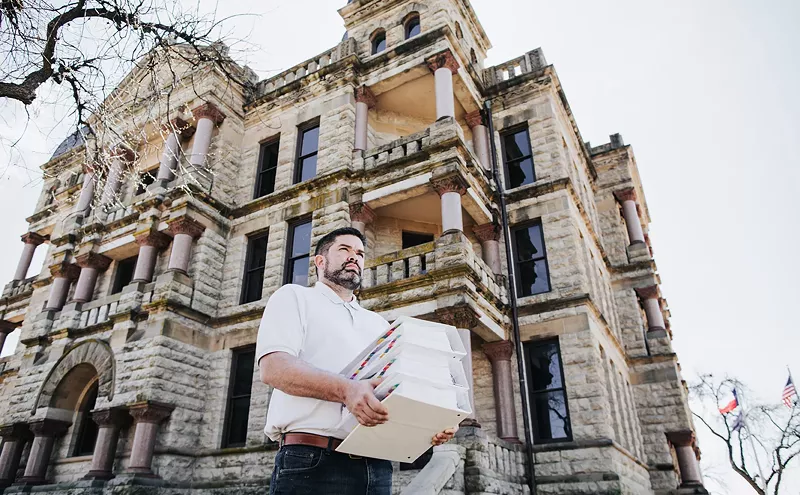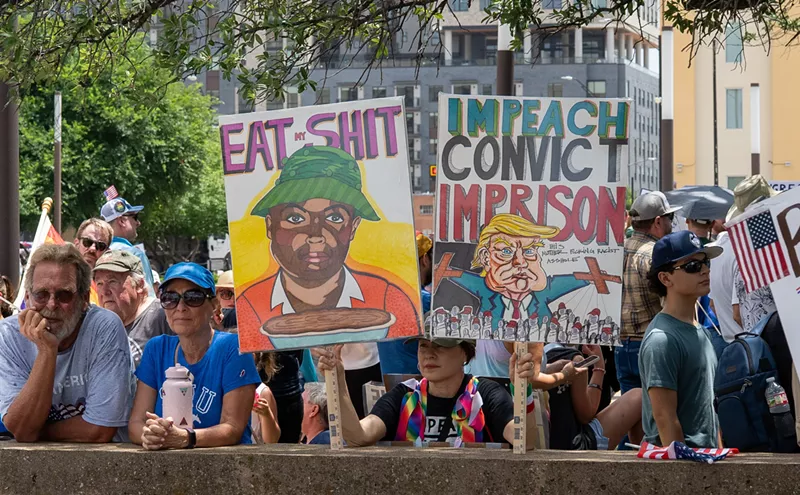How many people in Dallas know that our downtown farmers market is outclassed and out-performed by the farmers market in Detroit? Or that Dallas, which thinks of itself as a kind of capital of free enterprise, is way deeper into government control and regulation of farmers markets than Detroit?
Irony City.
I have been asking around and doing research on urban farmers markets for some months. I started with the Farmers Market Coalition, a national group, and they referred me to Professor Jim Bingen at Michigan State University in East Lansing, a national authority on farmers markets. He told me about the huge success achieved by Detroit's Eastern Market.
You could say, yeah, sure, he's some guy in Michigan, so of course he likes Michigan's biggest farmers market. And I'm from Detroit originally, so maybe it's a conspiracy. But Eastern Market in recent years has received rave reviews from the national and even foreign press as well as from experts.
Last August, Toronto's Globe and Mail, the national newspaper of Canada, published a fairly devastating portrait of Detroit—crushing debt, terrible unemployment, scary homicide rate—but singled out Eastern Market as a beacon of hope, a place that "thrives with local farmers on weekends."
OK, so ask yourself. Dallas doesn't have crushing debt or any of that other crushing stuff. Why is our own downtown farmers market so stubbornly moribund?
Bingen told me that the secret of Eastern Market's success may be its system of governance. At his suggestion I spoke with Ed Deeb, a prominent Detroit businessman, president of the Michigan Business and Professional Association, who is one of the volunteers credited with bringing Eastern Market back to life after dark times.
Deeb helped lead a successful campaign to pry Detroit's sprawling market out of the grip of Detroit city government entirely. In 2005, the market was placed under the control of a private 501(c)3 corporation run by and for its vendors, but also with strong input from private businesses surrounding the market.
Deeb told me the move to take the market out from under City Hall started in 1986, spurred by the vendors and the surrounding businesses. "They called me, and they said, 'Ed, we don't have a voice at City Hall at all. We call them. We send letters. Nobody responds.'"
After I spoke with Deeb, I tried to contact Dallas officials in charge of our own farmers market. The main administrative phone number for the market gave me a recording, which referred me to another number, which gave me a recording.
Uh, yeah, Mr. Deeb. You were saying?
"You've got to have a rapport between the people managing the market and the people that sell in the market. You've got to have a good management team. The guys that run the market have to know what they're doing. They have to be pleasant. They shouldn't be dictatorial."
He said the private entity running the Eastern Market devotes great energy and expense to promotion. "Here's what you gotta do," he said. "First of all you've got to advertise and promote. You've got to have special sales. You have to create events at the market like a parade down Main Street or a Gospel Fest or an Oktoberfest or Peach Week or Apple Week or whatever and get the people down there."
Deeb says attendance at Eastern Market has increased in the last few years from 30,000 people per weekend to 45,000, drawing from across Michigan, Ohio and Ontario. The annual flower show draws 100,000 people.
At a recent briefing for the Dallas City Council, Jack Ireland, an assistant city manager, presented attendance figures for our own market "estimated to be 2,000,000 per year." That would break down to about 5,700 visitors per day at the Dallas Farmers Market. I have my doubts.
Janel Leatherman, the market administrator, told me in an e-mail that the Dallas market carried out a customer count on Saturday, July 18, 2009, showing 9,300 people at the market between 10 a.m. and 5 p.m.
Let's take Leatherman's numbers, rather than the numbers shown to the city council. Who's going to tell those clowns the truth, anyway? We will generously round her numbers upward to show the Dallas Farmers Market drawing about 20,000 people per weekend.
That means that Detroit—a city 70 percent our size with about 5,000 percent more going against it—has a farmers market that draws two and a half times what ours does on a weekend. From surrounding states and another nation.
And what is the most notable difference in terms of City Hall governance here and in Detroit? They don't have any. And why do I care?
This is where we get to the ironies about Dallas as a place believing in free enterprise and the private sector. Last week at the same briefing where the city council was told the farmers market draws 2 million visitors a year (three times the annual attendance at the zoo), the council also was told another great truth about farmers markets in Dallas:
The thing farmers markets need most, according to assistant city manager Ireland, is more City Hall control. Ireland told the council that all of the fledgling neighborhood farmers markets cropping up in the city in the last two years need to be placed firmly under his boot.
Ireland spoke to the council to propose a reform of the neighborhood markets. Sitting in the cheap seats, I wondered what exactly the neighborhood markets had done to place themselves in need of reform. Were people getting drunk? Blaspheming?
Before the briefing I had read a proposed policy written by Bruce Bagelman, the proprietor of a popular market near White Rock Lake. Bagelman, a lawyer, researched Dallas ordinances and came to the conclusion that the six existing markets in Oak Cliff, North Dallas and East Dallas are already legal and fully controllable by City Hall under existing provisions for special events.
But Ireland wants much more control. He wants the neighborhood markets to be licensed and administered by the downtown farmers market. He wants to set specific percentages for the kinds of products they can sell. He wants to fix a limit for the total number that can exist in the city and the distance between them. And so on.
Ireland declined to speak to me, but asked that I submit questions to him in writing. I did. I asked what these controls and limits are based on. Could he show me any research?
Ireland wrote back, "Staff developed them based upon our conversations and understandings of experience in other cities."
But he offered no specifics. No names of cities. No rationale for imposing a three-mile buffer zone between markets or controlling by fiat what they can and cannot sell.
Eventually I was able to speak with City Manager Mary Suhm, who always tells me the truth, even when I don't like it. Well, actually, I think she tells me the truth especially when I don't like it. So I won't like it.
Suhm painted a grim picture of what could happen if neighborhood farmers markets are allowed to run amok. She suggested I would not be happy if my own neighborhood had a market selling, as she put it, "Half a dozen tomatoes and a bunch of pit bulls and bicycle parts."
Yikes. I never thought of it that way. It sounds like a scary movie. "FARMERS MARKET! Not just the tomatoes go splat."
But she was also fairly frank about another concern of City Hall—the fear that the fledgling markets, far from being horror shows, will be wildly successful and thereby steal traffic from the downtown market.
"We've invested a lot of money in the farmers market," Suhm said. "We're trying to create a destination where folks can come, and we're not there yet." She said there needs to be "a balance of the central farmers market" with the neighborhood markets.
But look: This is the same jam Uncle Joe Stalin got himself into with rubber boot quotas and such. For a guy who's busy running the purges, it's too hard to guess how many rubber boots the nation is going to need. The three-mile limits between neighborhood markets, the percentages of goods that can be sold: that kind of centralized regulation ignores the vagaries of who wants to go to a neighborhood market anyway and what they wind up wanting to buy when they get there.
That's how you wind up with huge rubber boot surpluses and tomato shortages, not to mention popular unrest. Why are we even talking about this?
The very best thing we could do for the downtown market is give it lots of sharp competition. And if those nimble little creatures out in the neighborhoods do come up with successful ideas, then the downtown market can copy them. I believe that's how it's supposed to work, is it not?
There are things the downtown market can do that the little ones can't. A parade down Main Street. A Gospel Fest, for goodness' sake. I wonder if there's a way we could get City Hall to bring Ed Deeb down here for a while? I wonder if he would be willing to wear a bow tie and short pants and call himself a consultant?












